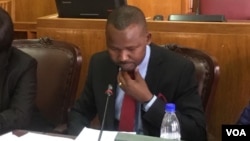Zimbabwe’s parliament wrapped up its nationwide gathering of public opinion on the Zimbabwe Media Commission Bill, in Harare, Friday, with a commitment to factor in suggestions that would make the bill more compliant as it relates to freedom of expression and the media, as guaranteed by the Constitution.
The chairperson of the Parliamentary Committee on Information, Prince Dubeko Sibanda, told attendants to the public hearing that Permanent Secretary of Information, Nick Mangwana, assured him that the bill would be amended to reflect public opinion shared during the hearings.
Sibanda also said specific amendments would address the powers of the minister of information, and the issue of co-regulation, which he said the Parliamentary Legal Committee realized were unconstitutional.
“The Committee realized that there are some clauses in the Bill that violate the Constitution of Zimbabwe,” said Sibanda, referring to some of clauses that pertain to the powers of the information minister with regards the appointment of the executive secretary and Commission staff members, regulations and other areas.
Sibanda said he would convene another meeting with all the relevant stakeholders to review the changes before the Bill was tabled before parliament, for debate.
On the turn out by the public to the hearings that were held this week in Gweru, Bulawayo, Masvingo, Mutare and Harare, Sibanda said he was pleased by the attendance, and also show of interest in the laws regulating the freedom and publication of information.
“They (the public) expressed their wishes, and they were heard. What they want to see happen is very clear,” said Sibanda, expounding on the public’s demand that the Commission that reports to parliament should be independently governed, and that the police should not be involved in matters pertaining to the Commission.
Despite Sibanda’s assurances that public contributions will be included into the final Bill, many who attended the hearings, like Chris Mhike, a journalist and a lawyer, remained skeptical.
“What we see being published in the government gazette and what is taken to parliament, doesn’t include the complains or other concerns raised by the ordinary people,” said Mhike, adding that, “we want this whole process (public hearing) which gives people the opportunity to speak – to be significant. What people say must be included in the final Bill passed by parliament.”
Director of the Voluntary Media Council of Zimbabwe, Loughty Dube, was also skeptical of the government’s promises to include public opinion views in the final Bill, saying past inputs were largely ignored, despite assurances by ministry officials.
“We want to see if the final Bill will include all this (public input), because we have been lied to for a long time, and this is what we now want to see,” said Dube.
Aside from what will be included in the final Bill, other attendants at the hearing raised concern about the leadership of the Zimbabwe Media Commission itself. Philbert Kufainyore said commissioners should be thoroughly vetted to ensure that no members of the army or police are included.
“My plea is that when this Commission is set up, it must look into the background (of candidates), to ensure that is not allowing in former members of the military, police or CIO (Central Intelligence Office) in the Commission,” said Kufainyore.
On who can or cannot be a member of the Commission, Sibanda said the Committee would consult lawyers to find out whether former members of the army or police are ineligible for consideration as commissioners.
Meanwhile, the Committee will compile a report on the outcome of the public meetings and submit that to parliament for a hearing. Information Minister Monica Mutsvangwa is expected to include the public’s views in the Bill before it is passed into law.




